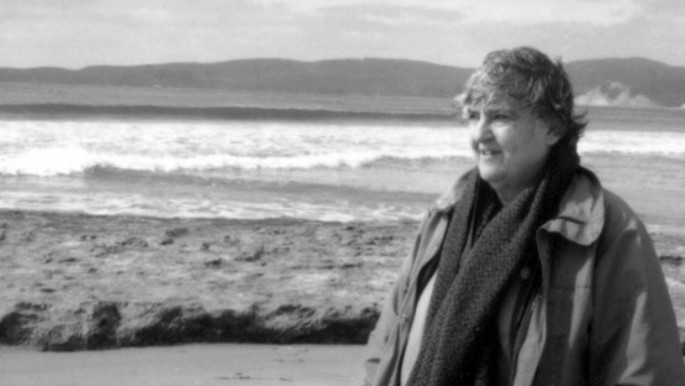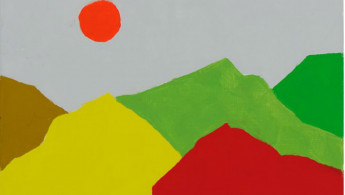Meeting Etel Adnan
In the three years I lived in Paris, I heard Etel Adnan's name mentioned often. She’s an Arab-American, you’re an Arab-American - why don’t you know her?
Adnan, a seminal Lebanese-American cultural figure famous for her poetry, prose, and artwork, is also considered to be one of the founders of the contemporary Arab art movement. At nearly 90, my grandmother’s age, she still paints and writes; and just this year the French government awarded her with one of its highest cultural honors: l’Ordre de ‘Chevalier des Arts et des Lettres.
The day finally came that I would meet her, but it was not by my doing. It was during the last days of spring, and my friend in New York asked if I could stop by Etel Adnan's apartment when in Paris to pick up two of her paintings. "She's waiting for you," Jamal said. The paintings were for an annual auction to raise money for a creative arts space in New York, and Etel was donating two of her pieces: one a watercolour of Cezanne-like tones, the other a radiant black acrylic - both of which were named "Mountain".
As I reached Adnan's apartment just behind the Luxembourg Gardens, I started to feel anxious about my visit. Yet once I was greeted by Simone Fattal, Adnan's lifetime partner, and our pleasantries quickly shifted from French to Arabic, my accent was placed and my anxiety, gone.
 |
|
| Etel Adnan at the Pacific [photo by Simone Fattal] |
"You're Palestinian?" Etel asked, already knowing the answer.
It's true that it isn't too hard to place the way I speak, despite how many times I’ve been told I sound Tunisian: a quandary that has something to do with the way I combine my mother's Jerusalem accent and the Gaza dialect my brothers all speak.
After the nervousness faded, we talked and talked as I would with a neighbour. I was surprised at how inquisitive Adnan was of me, when I thought it should be the other way around. Listening is something I do well, a trait not common to many, but it turned out that I was doing more talking, and Adnan was doing the listening. She asked me questions about my life, and when we made the Houston connection she told me stories about her time in Texas.
When she asked about my work, I told her that I was writing, mostly making a living with journalism, but that I had been trying to work at a novel, and that's when she told me to take her books with me. She even offered me one of her sketches, which I politely declined.
Exchanges
Not many get to meet someone like Etel Adnan these days. Maybe because it's difficult for her to travel, or that she rarely, if at all, communicates online. By the time I left her apartment, after a heartfelt conversation in her sun-drenched living room, I had been gifted with a bag full of books, and a feeling, which I felt in my stomach, of having just met one of the most lovely and interesting human beings.
And as she kissed me goodbye, she said: "Write to me if you ever need anything. You know the address."
| Much of our fight today is about redefining the spaces around us, not just observing and reflecting. |
Before I left Paris for New York, I decided I would start writing letters to her - one response to each book that I read. It had been a long time since I've been touched so deeply by a book, or in this case, books.
There is something poignant about the way Adnan chronicles cities, for someone whose own work is defined by the pursuit of cities, but I also relate to Adnan as an Arab feminist, as a person who grew up in a household of women, and especially as someone who has travelled and chronicled a search for the people of my past. Just as Adnan went to Greece to search for the voice of her mother, so, too, have I travelled to Palestine to search for what is left of my mother and grandmother's past.
In Of Cities and Women, an epistolary travelogue that chronicles Adnan's letters to the Lebanese historian, Fawaz Traboulsi, I found myself immersed in a text that could very well be a reflection of my own travel journals. The book was a response to Traboulsi's request that Adnan write an essay on feminism for the magazine Zawaya. And as she travelled from city to city across the Mediterranean - Barcelona, Aix-en-Provence, Skopelos, and Beirut - Adnan found herself musing over the question of feminism:
“I go through the streets of this town, 'mentally' writing you a letter, and another discourse keeps rolling in my mind…Women, when in the street, don't seem to consciously play a role, or live an exception: they are part of humanity, of a place, of a climate, of a country. They remind me that it is interesting to be alive, to be a human being, and to be part of a precise moment in time and space, that theories get lost when confronted with privileged experience.
"I thus renounced the idea of writing you a formal letter on 'feminism' and began writing that which was given to me.”
Statelessness
Much of what Adnan writes is an existential reflection on statelessness, no matter the city. Nostalgia is not something we find on her pages, but what we do see is the difficulty it takes to live as "daughters of dépaysement", or as children whose parents were exiled by war. As with many of her other texts on the nightmares of war - The Arab Apocalypse or Sitt Marie Rose to name but two - Adnan weaves and records her awareness of a burdensome past throughout her letters to Traboulsi.
And she does it with an honesty that, frankly, is a struggle to live up to. In the house where I grew up, women stayed near their families. And in my family, roles were never retranslated and women did not wander in the streets of other cities. Even today, in the city where I now live, my mother calls to still ask: "When are you coming home?"
Maybe that's why when Adnan talks about the humiliations of a city or of the violence of nationalism, or of seeking liberation as women often do, I find myself echoing her argument to Fawwaz: We don't know completely what we mean by freedom.
This is where I think Etel can teach us all a valuable lesson: much of our fight today is about redefining the spaces around us, not just observing and reflecting, but partaking in the confrontations of its huge range of emotions. Mostly, it's to remember that before being women, we are human.
One of the last letters I wrote her, while I was in Greece visiting friends, was based on a question that I had been toiling over since my first visit to Greece - which by now I had been calling "my other Palestine". For me, visiting the Greek sea and countryside were an extension of what I had imagined a liberated Palestine to resemble. I wrote to Adnan from Athens, on the back of a postcard that I don't know she ever received: "Can our search ever exceed the imagination?!
But before I followed up with her, the war on Gaza began and my distraction wandered off to another city, a place filled with something darker and more pressing than the pursuit of our human(e) desires.



